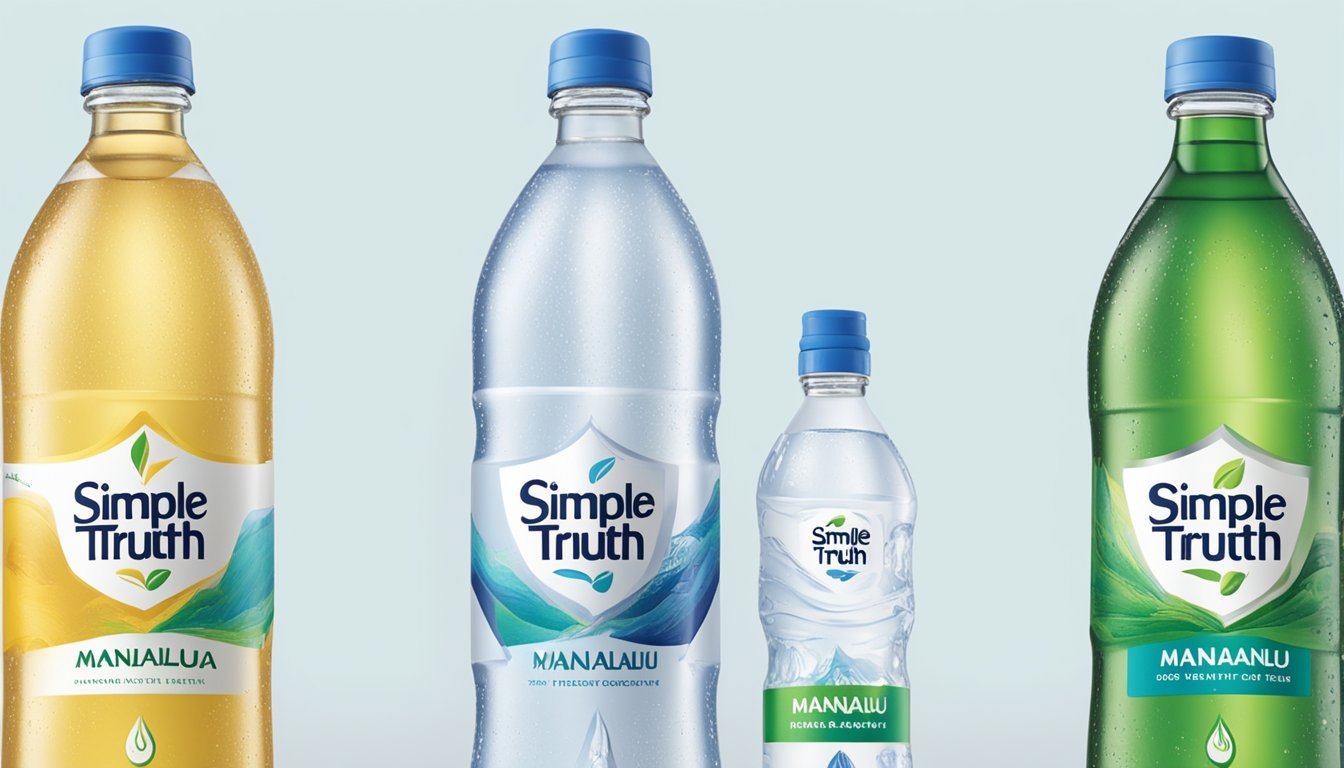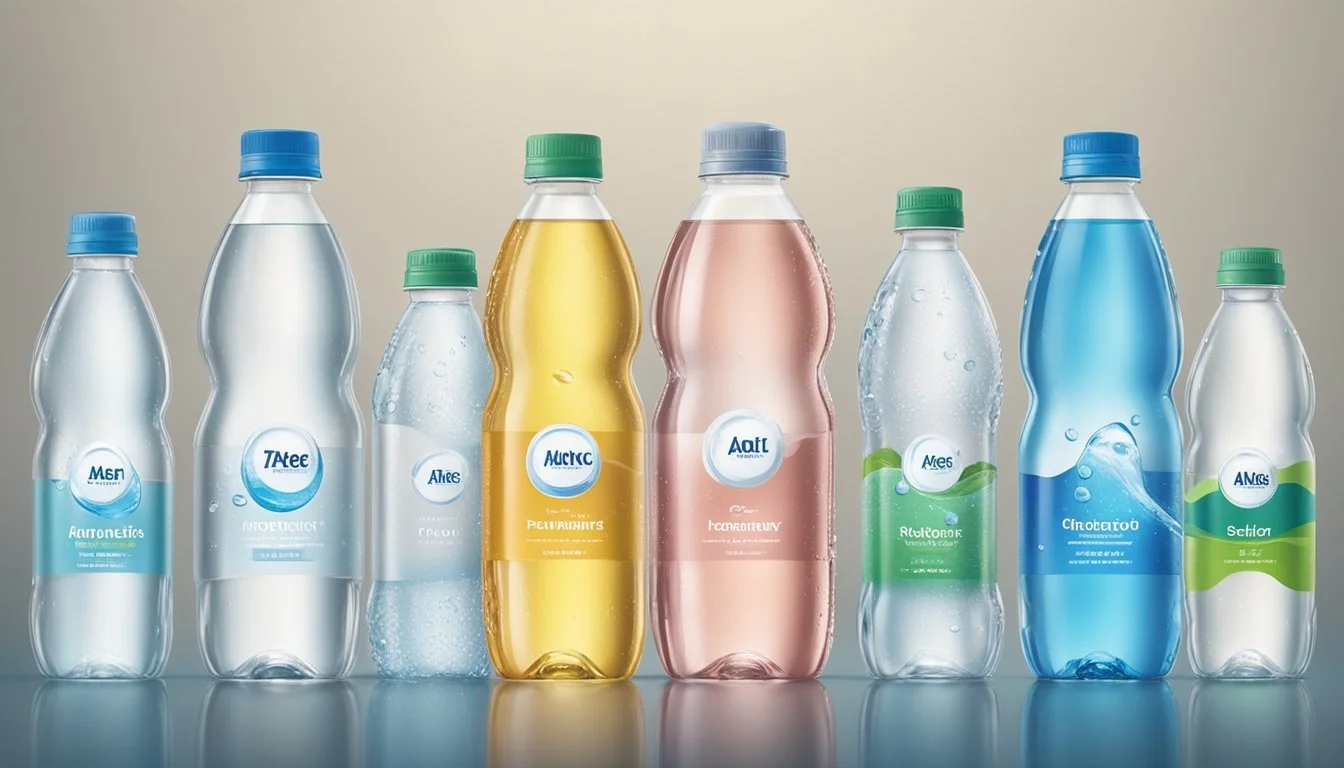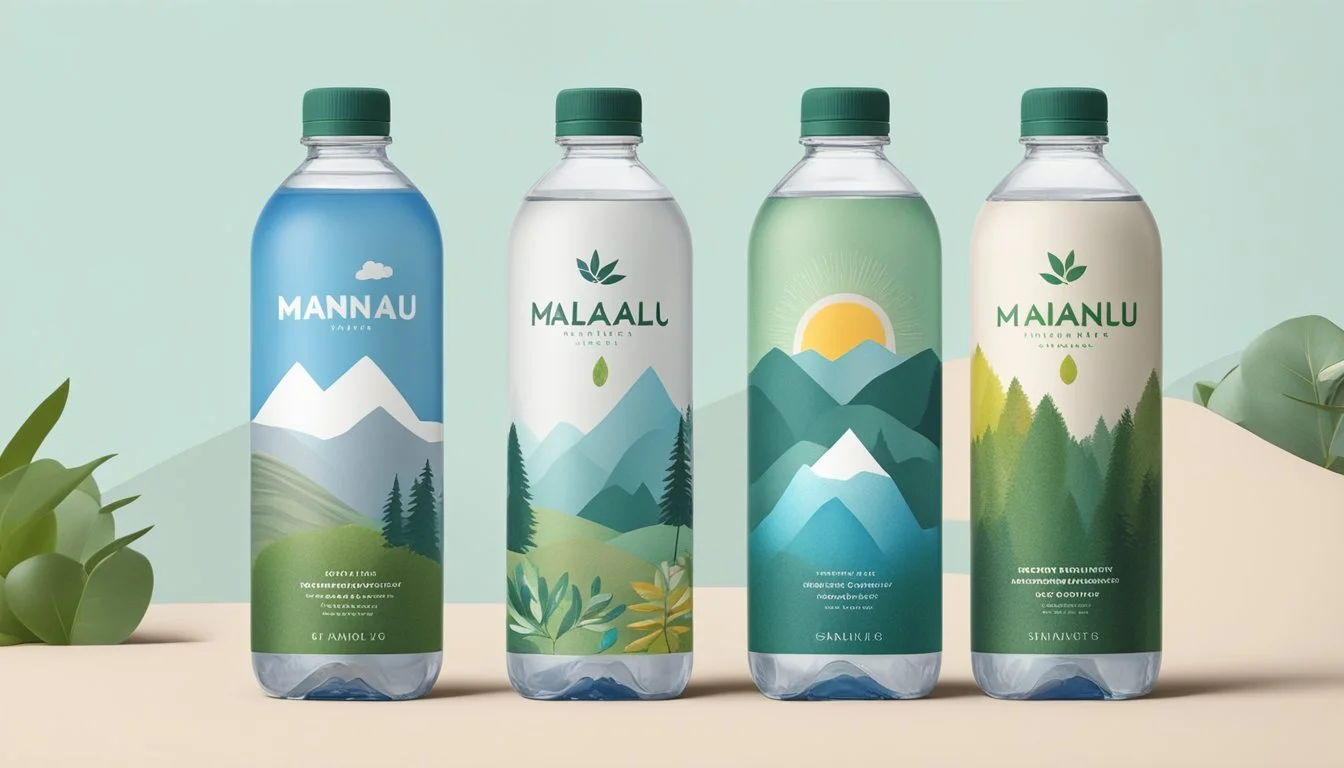Mananalu vs. Simple Truth
Bottled Water Showdown
When choosing between Mananalu and Simple Truth bottled water brands, the decision hinges on several factors, including taste, sustainability, and packaging. Mananalu, founded by actor and environmental activist Jason Momoa, offers water in 100 percent recyclable aluminum bottles, aimed at reducing single-use plastic waste. This innovative approach not only provides a pure and fresh taste but also significantly contributes to environmental conservation.
Simple Truth, a popular and widely available brand, focuses on delivering quality water in eco-friendly plastic bottles. While they have made strides in reducing their environmental impact, the use of plastic remains a concern for many consumers striving for zero-waste living. Mananalu's aluminum packaging offers a compelling alternative for those committed to sustainability.
The debate between these two brands ultimately reflects a broader conversation about environmental responsibility and consumer choices. Both brands offer high-quality hydration, but Mananalu's unique aluminum bottles provide an edge for eco-conscious consumers seeking to cut down on plastic use.
Brand Overviews
Mananalu and Simple Truth offer distinct approaches to bottled water, each with unique selling points and characteristics that appeal to different consumer preferences.
Mananalu, Jason Momoa's Vision
Mananalu was founded by actor Jason Momoa, known for his role as Aquaman. The brand is driven by a mission to eliminate single-use plastic. The company packages its purified water in 100% recyclable aluminum cans, providing an eco-friendly alternative to traditional plastic bottles.
Launched less than a year after the release of Aquaman (2018), Mananalu reflects Momoa’s commitment to environmental sustainability. The brand targets consumers who prioritize sustainability and ocean conservation.
Mananalu water is available online and in major grocery stores like Safeway, Whole Foods, and Sprouts Market.
Simple Truth, The Organic Choice
Simple Truth is a brand under the Kroger umbrella, known for its commitment to offering organic and natural products. Simple Truth bottled water emphasizes being free from artificial additives and promotes a health-conscious image.
The brand leverages the growing consumer demand for organic options and aligns with those who prefer products with minimal environmental impact. Simple Truth water is often found in Kroger-owned stores and focuses on transparency about its organic certification and sourcing.
The packaging tends to highlight the brand’s organic ingredients and environmentally friendly processes, drawing customers who are looking for pure and responsibly sourced water.
Product Specifications
This section focuses on the unique qualities and processing methods of Mananalu and Simple Truth bottled water. Key points include different bottle materials, water purification methods, and inclusion of electrolytes.
Mananalu Water Contents
Mananalu, founded by Jason Momoa, offers purified water in 100 percent recyclable aluminum bottles. The water undergoes a purification process involving reverse osmosis, which filters out impurities and contaminants. This process ensures the water is free from any harmful substances.
In addition, Mananalu water contains added electrolytes for enhanced hydration. The electrolytes typically include magnesium, calcium, and potassium, crucial for maintaining healthy body functions. The use of aluminum bottles is intended to reduce single-use plastic waste, aligning with the brand's strong environmental mission.
Simple Truth Water Processing
Simple Truth is another brand offering bottled water, commonly found in plastic bottles. The water processing method for Simple Truth involves a multi-step filtration process, often including reverse osmosis to purify the water. This ensures that the water is safe and clean for consumption.
The brand also incorporates a balance of key electrolytes, such as magnesium and potassium, which can improve hydration and flavor. Simple Truth focuses on providing accessible and widely available purified water. The plastic bottles are largely aimed at consumer convenience but have raised environmental concerns compared to aluminum alternatives.
Environmental Impact
Mananalu and Simple Truth's bottled water brands each have distinct impacts on the environment, notably in plastic pollution, benefits of aluminum containers, and recycling initiatives. These aspects drive their commitment to sustainability.
Plastic Pollution From Bottles
Plastic pollution is a significant concern. Single-use plastic bottles contribute to a large share of environmental waste.
Brands like Simple Truth often rely on plastic bottles, contributing to pollution, particularly ocean-bound waste. Plastic waste can take hundreds of years to degrade and poses severe threats to marine life.
The carbon footprint of producing and transporting plastic bottles also adds to the environmental strain, complicating efforts to reduce pollution.
Benefits of Aluminum Over Plastic
Aluminum offers notable advantages in reducing environmental impact. Mananalu uses 100% recyclable aluminum cans, which are infinitely recyclable and support a sustainable supply chain.
Aluminum is more durable and less likely to end up as litter. Aluminum's lighter weight compared to glass results in lower carbon emissions during transport.
Using aluminum instead of plastic can significantly cut down on single-use plastic waste, helping to curb pollution and unnecessary landfill use, making the switch crucial from an environmental standpoint.
Recycling and Repurposing Initiatives
Recycling plays a key role in environmental strategy. Mananalu's "Drink One, Remove One" initiative ensures that for each bottle sold, the equivalent amount of plastic is removed from ocean-bound waste.
Partnerships with organizations such as rePurpose Global reinforce this commitment. They have removed millions of plastic bottles from waste streams.
Using recycled aluminum and even recycled corrugated boxes for shipping further supports a closed-loop recycling system, reducing the need for raw materials and lowering the brand's overall carbon footprint.
The Coca-Cola company has also invested in similar initiatives to improve the recyclability and sustainability of their products, highlighting a broader industry shift toward sustainable practices.
Packaging Design
Both brands differentiate themselves through unique packaging solutions that prioritize environmental sustainability and consumer convenience. Each approach has its specific benefits and challenges in terms of material usage and impact on plastic waste reduction.
Mananalu's Aluminum Bottle
Mananalu's bottled water is packaged in 100% recyclable aluminum cans. These aluminum bottles are resealable, providing convenience for on-the-go consumers. Aluminum stands out for its high recyclability; nearly 75% of all aluminum ever produced is still in use today, making it a more sustainable choice compared to plastic.
The brand targets the reduction of single-use plastics by using aluminum, which is infinitely recyclable. This aligns with their mission to eliminate single-use plastic water bottles, thus decreasing environmental impact. The aluminum cans are also robust and durable, standing up to wear and tear better than plastic alternatives.
Simple Truth Packaging Ethics
Simple Truth utilizes plastic containers for their bottled water. While plastic is traditionally less sustainable than aluminum, Simple Truth has implemented measures to improve its environmental footprint. They focus on using recycled plastics and ensuring that their containers are designed to be refillable and recyclable.
Although plastic containers are not as eco-friendly as aluminum, Simple Truth aims to minimize waste through conscious design and material choices. Their packaging represents a step towards reducing single-use plastics, even if the material itself has inherent limitations regarding recyclability and environmental impact.
Simple Truth's efforts are part of a broader sustainability mission to provide more responsible consumer options, although the challenge of plastic waste remains significant. Their approach highlights the importance of improving packaging within existing material constraints.
Health Considerations
Choosing between Mananalu and Simple Truth involves understanding their nutritional content and water quality. These aspects are crucial for making an informed decision.
Nutritional Content Comparison
Mananalu prides itself on pure, fresh-tasting water with no added calories or sugar. It is packaged in 100 percent recyclable aluminum cans. This offers a sustainable option without compromising health benefits.
Simple Truth also offers pure water, often in plant-based packaging. While Simple Truth typically avoids added sugars and calories too, the presence of minimal plastic can influence one's health decision.
Both brands focus on delivering water with no caloric content, sugars, or artificial additives. They stick to providing straight, unadulterated water, making them comparable from a nutritional standpoint.
Water Quality Assessment
In terms of water quality, Mananalu ensures a high-quality purification process. This bottled water adheres to stringent safety standards, making it a reliable choice. Concerns about aluminum safety are unfounded according to current science, which deems it very safe.
Simple Truth also puts an emphasis on quality, often promoting their "pure" water sources. However, recent concerns about nanoplastics in bottled water bring an additional layer to consider. Studies show that plastic bottles can contain up to 240,000 tiny plastic particles per liter.
Overall, both brands prioritize cleanliness and purity in their products, but the materials used in packaging and potential for plastic contamination can be a deciding factor.
Market Availability and Options
Mananalu and Simple Truth bottled waters offer various purchasing options, both in physical retail locations and online platforms, catering to different consumer preferences and accessibility needs.
Retail Presence
Mananalu:
Available in prominent grocery store chains such as Whole Foods, Safeway, Sprouts Farmers Market, and Foodland.
Over 380 Sprouts locations stock Mananalu, appealing to eco-conscious customers.
Positioned in stores with a focus on sustainability.
Simple Truth:
Primarily found in Kroger-owned stores, including Kroger, Ralphs, Fred Meyer, and King Soopers.
Widely accessible due to Kroger's extensive network of over 2,700 stores nationwide.
Positioned as an affordable, organic option within the standard bottled water segment.
Online Purchasing Channels
Mananalu:
Can be purchased directly from the official Mananalu website.
Available on Amazon, often with special deals or free shipping offers for Prime members.
Online options provide ease of access for those looking to support its environmental mission.
Simple Truth:
Sold through the Kroger's digital platform, making it easy for loyal customers.
Available on Amazon, providing a convenient purchasing option.
Often included in online grocery delivery services, enhancing accessibility for consumers seeking organic and affordable water.
Community and Outreach
Mananalu and Simple Truth both prioritize community engagement and environmental outreach, leveraging partnerships and unique campaigns to enhance their impact.
Notable Campaigns
Mananalu's "Drink One, Remove One" initiative stands out as a significant environmental effort. With every bottle sold, the equivalent of one plastic bottle is removed from ocean waste. This initiative, in collaboration with Repurpose Global, underscores their commitment to reducing plastic pollution.
Simple Truth engages consumers through social media platforms like Instagram, showcasing their efforts in promoting sustainable living and encouraging community participation. Regular updates about their environmental actions keep the community informed and involved.
Partnership Initiatives
Mananalu partners with Hawaiian Airlines, offering passengers a sustainable alternative to single-use plastic water bottles. This partnership emphasizes their mission-driven approach to reducing plastic waste in travel and everyday life.
Simple Truth collaborates with local organizations to promote eco-friendly practices. They participate in community cleanup events and sponsor environmental awareness programs, reinforcing their dedication to sustainability.
These partnerships highlight the brands' efforts to integrate sustainability into daily routines while also fostering community involvement. Both brands actively engage in initiatives that promote their core values and environmental commitment.
Sustainability Goals
In comparing Mananalu and Simple Truth bottled water, it's essential to examine both brands’ sustainability goals. Both have dedicated missions to reduce their environmental impact, but the methods and commitments vary.
Climate Neutral Commitment
Mananalu aims for climate neutrality through their use of aluminum bottles. These bottles are infinitely recyclable, significantly reducing carbon emissions compared to single-use plastic. They also partner with organizations to offset their carbon footprint, ensuring every bottle sold contributes to environmental conservation projects.
Simple Truth focuses on reducing carbon emissions by using eco-friendly packaging. They often utilize recycled plastic and encourage reusability. Additionally, Simple Truth collaborates with carbon offset programs to further their climate-neutral goals. The brand’s commitment extends to renewable energy in their manufacturing processes, demonstrating a holistic approach to sustainability.
Future Sustainability Projects
Mananalu has plans to expand its sustainability mission. They are exploring refillable bottle initiatives, aiming to offer consumers reusable options that align with reducing waste. There is also an emphasis on further reducing carbon emissions through improved logistics and supply chain practices. Continual innovation in sustainable packaging remains a priority.
Simple Truth is also investing in future projects focused on sustainability. Their upcoming initiatives include sourcing from local purifiers to minimize transportation impact and support community water projects. They are researching new materials that promise higher sustainability and lower environmental footprints. These actions are part of their broader strategy to combat climate change through proactive measures.
Consumer Experience
Consumers are primarily interested in the unique taste of each brand and how these bottled waters fit into their health-conscious lifestyles.
Taste and Palate Comparison
Mananalu Water, founded by Jason Momoa, is known for its pure taste with a noticeable lack of metallic aftertaste, often found in aluminum containers. The water's smooth texture has garnered positive feedback from users who appreciate its clean and refreshing profile.
Still Water, often marketed under various brands including Simple Truth, also prioritizes purity. This product is noted for its neutral flavor and crisp finish that enhances hydration without any distinct aftertaste, making it preferable for those who enjoy a more traditional water experience.
The differences boil down to personal preference, with Mananalu's eco-friendly mission also appealing to environmentally conscious consumers.
Economic Implications
This section explores the economic impacts of Mananalu and Simple Truth bottled water. It examines their cost dynamics and the value perception of each brand in the market.
Cost Analysis
Simple Truth offers a range of bottled water options, typically priced lower due to their widespread distribution through major retailers. Prices usually reflect the scale economies achieved by larger production and distribution capabilities.
Mananalu, on the other hand, tends to attract a higher price point. This is partly due to the premium positioning of aluminum cans compared to traditional plastic bottles. The brand's environmental initiatives also contribute to the unit cost, as sustainable materials and ethical production practices generally incur higher expenses.
Comparatively, consumers may find Simple Truth more economically accessible on a per-unit basis. However, Mananalu's cost structure emphasizes sustainability and ethical production, appealing to a different consumer segment willing to pay for environmental impact.
Brand Value and Perception
Mananalu leverages its strong association with actor Jason Momoa and its mission to combat single-use plastics. This alignment with high-profile advocacy and environmental sustainability raises the perceived value among eco-conscious consumers.
In contrast, Simple Truth is positioned as a reliable, affordable option. Its brand equity is built on providing accessible and cost-effective products, which resonates well with budget-conscious customers.
Both brands** cater to distinct market segments**: Mananalu's value perception is tied to its premium, eco-friendly proposition, while Simple Truth relies on affordability and widespread availability for its market appeal. The variations in brand strategies reflect their economic positioning and influence consumer choices based on price sensitivity and environmental values.
Legislation and Environmental Policy
Understanding the role of legislation and environmental policies reveals how they shape the bottled water industry and drive efforts to reduce waste and protect ecosystems.
Bottled Water Regulations
Bottled water is subject to stringent regulations to ensure safety and quality. In the United States, the Food and Drug Administration (FDA) oversees bottled water standards while the Environmental Protection Agency (EPA) regulates public drinking water systems. These regulations mandate testing for contaminants and require accurate labeling of water sources and contents.
Additionally, labels must reflect the true nature of the water, whether it is spring, mineral, or purified. Countries within the European Union follow similar stringent regulations, governed by the European Food Safety Authority (EFSA), to ensure consumer safety.
Impact of Environmental Laws
Environmental laws play a crucial role in addressing the impact of single-use plastics, including plastic bags and water bottles, on the environment. Countries are increasingly implementing bans and taxes on single-use plastics to reduce pollution. For example, the European Union's Single-Use Plastics Directive aims to phase out certain plastic products.
Initiatives like these encourage companies to adopt sustainable packaging alternatives. Companies like Mananalu are proactive, offering water in recyclable aluminum cans to avoid the environmental impact associated with plastic waste. These policies not only mitigate environmental damages but also push the industry toward more sustainable practices.
More About Mananalu
Hawaiian Springs vs Mananalu: Which Bottled Water is Better?
Icelandic Glacial vs Mananalu: Which Bottled Water is Better?
Mananalu vs Cascade Mountain: Which Bottled Water is Better?
Mananalu vs Kirkland Signature: Which Bottled Water is Better?
Mananalu vs Richard's Rainwater: Which Bottled Water is Better?
Mananalu vs Talking Rain AQA: Which Bottled Water is Better?
Mananalu vs Whole Foods Italian Still Mineral water: Which Bottled Water is Better?
Mountain Valley Spring Water vs Mananalu: Which Bottled Water is Better?
Nestle Pure Life vs Mananalu: Which Bottled Water is Better?
More About Simple Truth
Aqua Carpatica vs Simple Truth: Which Bottled Water is Better?
Cascade Mountain vs Simple Truth: Which Bottled Water is Better?
Core Hydration vs Simple Truth: Which Bottled Water is Better?
Crystal Geyser vs Simple Truth: Which Bottled Water is Better?
Hawaii Volcanic vs Simple Truth: Which Bottled Water is Better?
Hawaiian Springs vs Simple Truth: Which Bottled Water is Better?
Ice Mountain vs Simple Truth: Which Bottled Water is Better?
Icelandic Glacial vs Simple Truth: Which Bottled Water is Better?
Liquid Death vs Simple Truth: Which Bottled Water is Better?
Mountain Valley Spring Water vs Simple Truth: Which Bottled Water is Better?
Nestle Pure Life vs Simple Truth: Which Bottled Water is Better?
Poland Spring vs Simple Truth: Which Bottled Water is Better?
Purely Sedona vs Simple Truth: Which Bottled Water is Better?
Richard's Rainwater vs Simple Truth: Which Bottled Water is Better?
San Pellegrino vs Simple Truth: Which Bottled Water is Better?
Simple Truth vs Crystal Lake: Which Bottled Water is Better?
Simple Truth vs Essence pH10: Which Bottled Water is Better?
Simple Truth vs Kirkland Signature: Which Bottled Water is Better?
Simple Truth vs Proud Source: Which Bottled Water is Better?
Simple Truth vs Talking Rain AQA: Which Bottled Water is Better?
Simple Truth vs Whole Foods 365: Which Bottled Water is Better?
Solan de Cabras vs Simple Truth: Which Bottled Water is Better?
Whole Foods Italian Still Mineral water vs Simple Truth: Which Bottled Water is Better?







